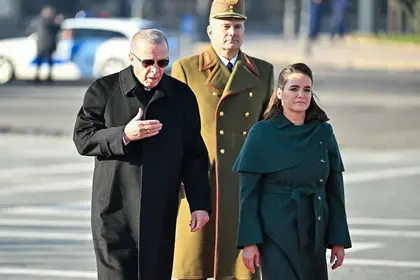Turkish President Recep Tayyip Erdogan arrived in Budapest on Monday to meet with his Hungarian ally Viktor Orban, in his second visit to the country within four months aimed at deepening ties.
Erdogan will be received with military honours in Budapest's historic Heroes' Square before heading into a meeting with Hungarian President Katalin Novak.
JOIN US ON TELEGRAM
Follow our coverage of the war on the @Kyivpost_official.
He will then hold bilateral talks with Hungarian Prime Minister Viktor Orban.
Current "regional and global issues" and "steps to be taken to deepen bilateral cooperation" will be discussed, according to the Turkish presidency.
Energy security and Sweden's NATO membership are expected to be on Monday's agenda as well, with Hungary and Turkey being the only holdouts among the alliance to not have ratified the Nordic country's bid yet.
Hungary has still not voted to approve Sweden's entry into NATO, aligning itself with Turkey which had long blocked Stockholm's membership and has been stalling the process even after Erdogan lifted his veto in June.
Earlier this month, Erdogan made Turkey's ratification of Sweden's NATO bid conditional on the US Congress "simultaneously" approving Ankara's request for F-16 fighter jets.
Erdogan's visit coincides with the 100th anniversary of the establishment of diplomatic relations between the two countries.
Later on Monday, the two leaders will co-chair a meeting of the Turkish-Hungarian High-Level Strategic Cooperation Council.

Türkiye, Syria, Russia and US
The signing of several bilateral agreements with Orban is also scheduled.
Hungary is the only EU member state that has maintained close ties to the Kremlin since the beginning of the Ukraine war.
In recent years, Hungary has pursued a policy of opening up to the east, not only towards Russia but also towards China and central Asian countries.
You can also highlight the text and press Ctrl + Enter






